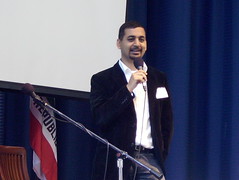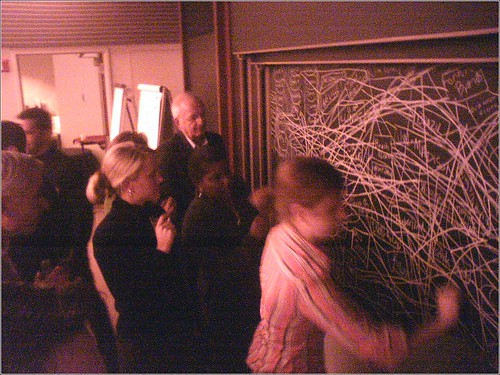 Robert Scoble and Shel Israel gave a little bit of background on their book Naked Conversations.
Robert Scoble and Shel Israel gave a little bit of background on their book Naked Conversations.
Key points: Listening…a person who starts a blog on “quilting” will be indexed in two hours.
Shel Israel tells a story about Vyew, instigated by Dennis Howlett. Vyew listened to the needs Dennis and incorporated feedback into their product within days. Outstanding.
“A startup can get instant global feedback by an audience who cares…it’s R&D on steroids.”
“One of the things that blows me a way is that during the course of a week, I have conversations with people in a dozen countries.”
“Fundamentals are just that…fundamental. But these things take time. Blogging is not the revolution — conversation is the revolution.” — Shel Israel
Q: What’s the difference between a “group” blog and an individual blog?
A: (scoble) Within Microsoft, group blogs are discussed in a committee. They are vetted and approved, they are slowed down and watered down.
A: (israel) I think group blogs are going to get more unfiltered over time. Right now, if you look at the tech sector, the only big one is TechDirt. (Scoble rebuts, that some teams within Microsoft have team blogs that are very popular.)
Q: As people blog, are the able to be more of themselves? I’m interest in the differences between who people “are” when they’re on a company blog? Are people able to be more of “who they are” when they’re on their blogs?
A: (israel) By companies allowing companies to allow middle level employess to blog, they are creating a culture that is humanizing the company. (ed. – BRAVO!). What is happening…we want to remain humans when we go to work. We want the world to know “I’m more than just the person who sits in cube #72X.”
Q: What would you do if you were going to blog about issues you were having at work with a supervisor?
A: (israel) You’d want to think about that. Yes, test the membranes of the company…but dont be stupid. When you blog, don’t do things that will prevent you from getting your next job — digial lasts forever.
A: (scoble) If you’re going to take on your boss, or take on your management, you have to know that you’re taking a risk. Have your eyes open, and that you’re taking on a culture. Go in with your eyes open and know that you’re putting your job on the line. Someone link Mark Jens broke a rule…talking about financial results, and that will get you in trouble in a public company. He poured fuel around his own feet, and lit it on fire.
Q: How do you deal with comments, especially when the comments devolve in incivility?
A: (scoble) I’m now taking the “living room” rule. If a comment is not something that I’d expect to hear in my own living room, I’ll take that comment out. I don’t want to subject my readers to that.
A: (israel) If you have a company, these kinds of negative comments are going on anyway. For me, the big education is in listening to the negative comments. Skip past the first sentence where they call you names, and go to sentence three where they get to the root of their issue. Companies that can do this inch closer to their customers, and the wisdom of crowds sets in, and companies begin to get a lot wiser.
Q: Christopher Allen asked about the “Tyranny of the Popular.” “I want to take the ‘long tail,’ and cut off the head. The ‘popular’ dominates the first twenty pages.”
A: “Aggregators of the popular like Memeorandum are like purified sugar, and you need some fiber in your life.” – Scoble
More thoughts: Howard Greenstein



